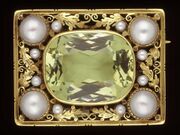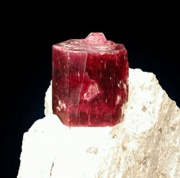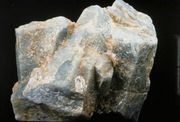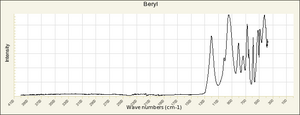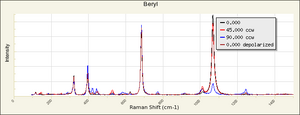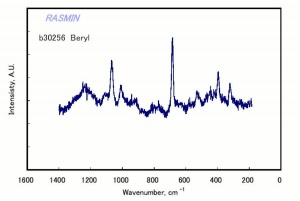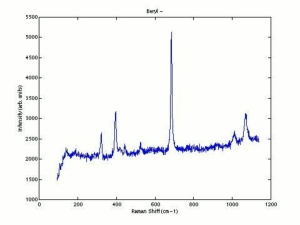Beryl
Description
Any of several minerals and gemstones composed of beryllium aluminum silicate. The best known beryls are Emerald (green) and Aquamarine (blue); other types are Heliodor (yellow) and Morganite (pink). Beryl crystals occur in granites and pegmatites. Gem quality beryl crystals are found worldwide. They have been gathered or mined since 3000 BCE. High quality beryl gems are mined in Columbia, Brazil, Zimbabwe, South Africa, Namibia, and the U.S. (Califonia, Maine, Connecticut, South Dakota, and North Carolina). The largest recorded beryl crystal was found in Madagascar; it weighed 36 tons and measured 60 feet long.
Synonyms and Related Terms
emerald (bright green); aquamarine (blue); heliodor (yellow to brown); morganite (pink to purple); goshenite (colorless); Beryll (Deut.); béryl (Fr.); beril (Fr.); berilo (Esp., Port.); beryl (Ned.)
Risks
- Beryllium is a known carcinogen.
Physical and Chemical Properties
- Hexagonal system with prismatic crystals usually striated lengthwise
- Cleavage = poor in one direction
- Fracture = uneven to conchoidal
- Luster = vitreous
- Streak = colorless to white
- Fluorescence = none to weak (synthetic stones may appear opaque and dull red under long UV light)
- Pleochroism = variable (depending on color)
- Inclusions = liquid, two-phase or tubular
| Composition | Be3Al2(SiO3)6 |
|---|---|
| Mohs Hardness | 7.5 - 8.0 |
| Density | 2.68-2.83 g/ml |
| Refractive Index | 1.57 - 1.60 |
| Birefringence | 0.005 - 0.009 |
Comparisons
Resources and Citations
- Gem Identification Lab Manual, Gemological Institute of America, 2016.
- Mineralogy Database: Beryl
- Sue Fuller, Rocks and Minerals, DK Publishing, Inc., New York City, 1995
- Jack Odgen, Jewellery of the Ancient World, Rizzoli International Publications Inc., New York City, 1982
- R.F.Symmes, T.T.Harding, Paul Taylor, Rocks, Fossils and Gems, DK Publishing, Inc., New York City, 1997
- A.Lucas, J.R.Harris, Ancient Egyptian Materials and Industries, Edward Arnold Publishers Ltd., London, 4th edition, 1962
- Encyclopedia Britannica, https://www.britannica.com/topic/Britannica-Online Comment: "beryl" [Accessed September 19, 2003].
- Website: http://www.geo.utexas.edu/courses/347k/redesign/gem_notes/Beryl/beryl_triple_frame.htm (Fluorescence information)
- C.W.Chesterman, K.E.Lowe, Audubon Society Field Guide to North American Rocks and Minerals, Alfred A. Knopf, New York, 1979
- Wikipedia: Beryl (Accessed Oct. 18, 2005 and Dec 2022)
- G.S.Brady, Materials Handbook, McGraw-Hill Book Co., New York, 1971 Comment: p. 101
- Richard S. Lewis, Hawley's Condensed Chemical Dictionary, Van Nostrand Reinhold, New York, 10th ed., 1993
- Random House, Webster's Encyclopedic Unabridged Dictionary of the English Language, Grammercy Book, New York, 1997
- The American Heritage Dictionary or Encarta, via Microsoft Bookshelf 98, Microsoft Corp., 1998
- CRC Handbook of Chemistry and Physics, Robert Weast (ed.), CRC Press, Boca Raton, Florida, v. 61, 1980 Comment: density=2.69-2.7
